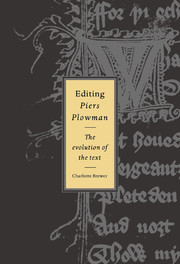Book contents
- Frontmatter
- Contents
- Acknowledgements
- Abbreviations
- Note on the texts
- Introduction
- Part I The early phase
- 1 Crowley
- 2 Percy, Warton, Tyrwhitt, Ritson
- 3 Whitaker and Price
- 4 Wright
- Part II The late nineteenth century
- Part III The Skeat aftermath
- Part IV Chambers and Grattan, Knott and Fowler
- Part V The Athlone Press edition
- Part VI Epilogue: the Athlone aftermath: Schmidt, Pearsall, Rigg-Brewer, et al.
- Works cited
- General index
- Index of manuscripts
- CAMBRIDGE STUDIES IN MEDIEVAL LITERATURE
4 - Wright
Published online by Cambridge University Press: 20 August 2009
- Frontmatter
- Contents
- Acknowledgements
- Abbreviations
- Note on the texts
- Introduction
- Part I The early phase
- 1 Crowley
- 2 Percy, Warton, Tyrwhitt, Ritson
- 3 Whitaker and Price
- 4 Wright
- Part II The late nineteenth century
- Part III The Skeat aftermath
- Part IV Chambers and Grattan, Knott and Fowler
- Part V The Athlone Press edition
- Part VI Epilogue: the Athlone aftermath: Schmidt, Pearsall, Rigg-Brewer, et al.
- Works cited
- General index
- Index of manuscripts
- CAMBRIDGE STUDIES IN MEDIEVAL LITERATURE
Summary
The publications of Whitaker and Price, however different in scope and quality, were characteristic of their time. The general interest in medieval literature which Percy's Reliques both answered to, and in its turn strengthened, bore fruit in the nineteenth-century explosion of literary book societies, whose main purpose was to publish unedited manuscripts. 1812, the year before Whitaker's edition appeared, saw the establishment of the Roxburghe Club, a highly exclusive society which took pride in restricting access to its own ranks and originally limiting the number of copies of each volume published. In the following years, a number of other societies, often with the same members, followed suit, producing a host of important first editions of early English works; for example the Bannatyne Club (founded in 1823, with Walter Scott as its first president, which in 1839 published a landmark in Middle English editing, Madden's anthology of the Gawain poems), the Maitland Club, founded in 1828, the Surtees Society (1834) and the Ælfric Society (1842). The Camden Society (1838) counted Thomas Wright, the future editor of Piers Plowman, as one of its founder members, including his famous Political Songs among its first publications, and the Percy Society (1840), of which he was also a founder member, published along with many other works Wright's new edition of the Canterbury Tales (1847–51).
In the March 1848 issue of the Quarterly Review, a long unsigned review article entitled ‘Antiquarian Book Clubs’ (pp. 309–42) castigated some of these societies for deliberately making their publications scarce and difficult to come by, and criticised manuscript owners for sitting on their treasures and effectively barring scholarly access.
- Type
- Chapter
- Information
- Editing Piers PlowmanThe Evolution of the Text, pp. 50 - 62Publisher: Cambridge University PressPrint publication year: 1996

